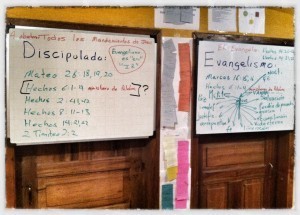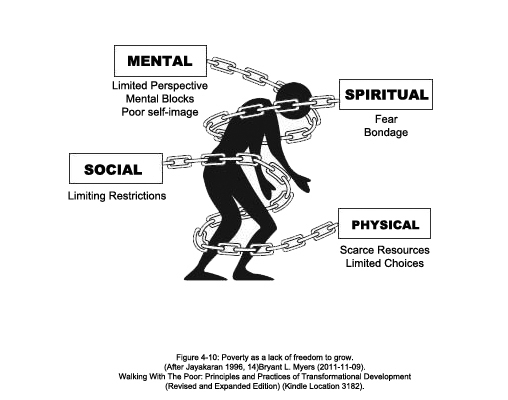Miguel Labrador's Blog, page 25
December 10, 2012
The Gospel is in the Go!

 I keep going back to the commissions at the end of Matthew and Mark. I don’t do it purposefully, but my mind wants to pit these two commands of Jesus against each other. What do I mean? Let’s take a look…
I keep going back to the commissions at the end of Matthew and Mark. I don’t do it purposefully, but my mind wants to pit these two commands of Jesus against each other. What do I mean? Let’s take a look…
The Matthew Text: ”Then Jesus came to them and said, “All authority in heaven and on earth has been given to me. Therefore go and make disciples of all nations, baptizing them ina the name of the Father and of the Son and of the Holy Spirit, and teaching them to obey everything I have commanded you. And surely I am with you always, to the very end of the age.” Matthew 28:18,19,20
It’s clear that the commission here is to “Make Disciples.” The means by which that is done are “Going,” “Teaching to obey all that Christ commanded,” and “baptizing.” Fair enough.
The Markan Text: “He said to them, “Go into all the world and preach the good news to all creation.“
It’s clear that the commission here is to “Evangelize.” The means by which that is done are “going” and preaching the good news.
It’s easy to see how so many can erroneously cleave evangelism & discipleship by pitting these two commissions against one another. I am prone to do the same. Then it struck me…
What if the “Evangelism” part of “Making Disciples” was in the “Go” of the Great Commission? What if the making of disciples requires evangelism? It just doesn’t make sense to say the reverse, that evangelism requires the making of disciples. Maybe we can dump the idea that says, first we evangelize people, then we disciple them.
Isaiah wrote, “How beautiful on the mountains are the feet of those who bring good news, who proclaim peace, who bring good tidings, who proclaim salvation, who say to Zion, “Your God reigns!” Isaiah 52:7 In order for the good news to be brought, someone had to go. With this thinking, my desire to cleave these commissions into distinct actions almost disappears. There is however, a slight problem. I remain somewhat unconvinced. So, am I reaching too far, or does it sound right to you?













CommentsI stand corrected Miguel. I really like your quote that ... by David WoodsJonathan, What a well thought out and written response. I ... by MiguelIs it not true that “as you are going” (or “as you go”) ... by Jonathan“Evangelism” is simply proclaiming the good news. That's ... by Jim WrightSomeone came up to me a few years ago, shook my hand and ... by Laurie NorrisPlus 5 more...Related StoriesDiscipleship DegradationAren’t All Christians Supposed to Make Disciples, Be Witnesses, and Evangelize?Did Jesus Have Discipleship Classes?
Discipleship Degradation

 Degradation (from Latin: degradatio, literally — reduction), regression — the process of deterioration of characteristics of an object with time; moving back; gradual decline; decline in quality; breakdown of matter due to the impact of external forces in conformity with the laws of nature and time.* Degradation can be used in the following ways:
Degradation (from Latin: degradatio, literally — reduction), regression — the process of deterioration of characteristics of an object with time; moving back; gradual decline; decline in quality; breakdown of matter due to the impact of external forces in conformity with the laws of nature and time.* Degradation can be used in the following ways:
Biodegradation – The processes by which organic substances are broken down by living organisms
Chemical decomposition - The degradation of chemical compounds
Corruption – Philosophical conceptual degradation
Degradation - Telecommunications, the loss of quality of an electronic signal
Elegant degradation – In engineering, the gradual failing of a machine
Environmental degradation - In ecology, damage to the ecosystem and loss of biodiversity
Computing – the corruption or degradation of a file, program, image, etc.
Each of the above can be applied, by way of analogy, to discipleship. I’ll draw some analogies and invite you to add others in the comment section. But first a simple definition of discipleship:
“Ever moving closer to Christ & His Gospel while serving, teaching, encouraging, facilitating, and empowering others do the same.”
Do you like that definition? Again, use the comment section below to suggest any changes. Regardless of how we define discipleship, it must always have at least two components. Being and Doing. We “be”come a disciple when we begin to follow. Inward discipleship is the obeying of all that Christ commanded. When we Make Disciples by doing – going, gospelizing, teaching others to obey all that Christ commanded and by baptizing, we are disciples and help others to do the same.
Discipleship, personal or external, is about following. One can not follow a stationary object. Discipleship always requires message and movement.
Now, let’s get back to degradation:
Is it possible for discipleship, both personal and external to degrade?
Can we be broken down by other “living organisms?”
Can the chemistry or elements of discipleship decompose?
Can the message (the gospel) of discipleship become corrupt?
Can the quality of the signal degrade?
Can the machine of discipleship simply give out?
Can damaging our ecclesiastical ecosystem destroy the church’s biodiversity?
The implied answer in each of these cases is, of course, yes. How does it occur in each of the above examples? Again, I’ll leave that to you to comment on below. While some deny that 2 Timothy 2:2 is about discipleship, the principle contained therein applies here.
“And the things you have heard me say in the presence of many witnesses entrust to reliable men who will also be qualified to teach others.” Here we have the passing on of the medium and message for four generations. The medium is Christ and the message, His Gospel. This leaves little, if any wiggle room for degradation. If Christ lives in us personally and in community, then the church shouldn’t be biodegradable. Further, when we discuss the natural order of things, specifically with regard to entropy, we understand that nature tends from order to disorder in isolated systems. Degradation is natural. The church however, shouldn’t be an isolated system. It’s not natural, it’s Supernatural. Degradation is Counter-Kingdom. It is in God that we live and move and have our being (Acts 17:28) God works all things to the order of His will (Romans 8:28,28,30) (Ephesians 1:11) (Isaiah 25:1) etc.
I find it fascinating, that in digital technology, a file or program can degrade or become corrupt. If it’s hacked, that’s easy enough to understand. But if you make a perfect copy of something and a perfect copy of the copy, then how do electronic copies degrade? Likewise, if we’re making disciples who make disciples, then shouldn’t the process always be “upgrading” instead of degrading?
~
Related Links:
Discipleship Detachment
Did Jesus Have Discipleship Classes?
Discipleship, Let’s Face It! ™
~

My Ebook, “ 14 Shifts in Disciple Making and A Framework ,” will not be free for download At Amazon until after the first of the year. But you can purchase it HERE.
*Wiki













CommentsWe travelled to Sierra Leone for our annual trek to a ... by CarolDavid, My context for using the word “upgrade” is: ... by MiguelJailer, thanks for commenting… One of the dangers in ... by MiguelDavid — also perhaps worth considering: ... by JailerDavid — I take your point, but I think you take it too far. ... by JailerPlus 2 more...Related StoriesAren’t All Christians Supposed to Make Disciples, Be Witnesses, and Evangelize?Did Jesus Have Discipleship Classes?The Mistakes of Jesus’ Disciples. Then, and Now
December 7, 2012
Optimizing Mission


Pathways International – Optimizing Mission
In an ever growing E-world, the importance of “optimization” becomes equally critical. There’s a few things that the mission focused can learn from online optimization:
Less storage space on the server – Less “space” in general. Dumping the warehouse or storage unit mentality and refitting your mission for rapid and targeted deployment may optimize your resources. Think smaller, more effective distribution nodes or a mission routers.
Less bandwidth is needed to process the file – Those who provide mission bandwidth and those who use it will be less likely to be throttled by an optimized missional process. All mission work need not be HD. Low Tech(nique) Spirit empowered mission can be more effective than a gaggle of gadgetry.
Less storage and bandwidth needs mean that hosting costs are decreased - Less physical space and less stuff optimizes the mission and minimizes the materials supposedly needed to accomplish it. Less stuff reduces cost or better serves to optimize every dollar for mission.
Faster file and page loads correlate to a positive visitor experience which can lead to more visits - Community experience is enhanced when we can deliver the message of our mission (The Gospel) minus fluff and falsehood. Given the ever shortening attention span of the average human, an optimized gospel delivery system just makes sense.
Perhaps some of you who know a bit more about Web Page, Internet, and the Online transmission of information than I do can make some other suggestions for what the mission focused can learn from online optimization. Can you?












 Related StoriesPoverty as a Lack of Freedom to GrowAren’t All Christians Supposed to Make Disciples, Be Witnesses, and Evangelize?Maybe It’s Not the Pastor that Leaves the Ninety-Nine in Search of the One
Related StoriesPoverty as a Lack of Freedom to GrowAren’t All Christians Supposed to Make Disciples, Be Witnesses, and Evangelize?Maybe It’s Not the Pastor that Leaves the Ninety-Nine in Search of the One
Maybe It’s Not the Pastor that Leaves the Ninety-Nine in Search of the One

 “What do you think? If a man has a hundred sheep, and one of them has gone astray, does he not leave the ninety-nine on the mountains and go in search of the one that went astray? And if he finds it, truly, I say to you, he rejoices over it more than over the ninety-nine that never went astray.” Matthew 18:12,13
“What do you think? If a man has a hundred sheep, and one of them has gone astray, does he not leave the ninety-nine on the mountains and go in search of the one that went astray? And if he finds it, truly, I say to you, he rejoices over it more than over the ninety-nine that never went astray.” Matthew 18:12,13
Have you heard a teaching regarding this parable suggesting that one of the qualities of a good “Pastor,” is that he will be predisposed to leave his congregation to go in search of the one stray or lost sheep? I have. In fact, I may have even taught it a few times.
Let’s look at a parallel passage:
“Then Jesus told them this parable: “Suppose one of you has a hundred sheep and loses one of them. Does he not leave the ninety-nine in the open country and go after the lost sheep until he finds it? And when he finds it, he joyfully puts it on his shoulders and goes home. Then he calls his friends and neighbors together and says, ‘Rejoice with me; I have found my lost sheep.’ I tell you that in the same way there will be more rejoicing in heaven over one sinner who repents than over ninety-nine righteous persons who do not need to repent.” Luke 15:3-7
Do you notice something strange here?
The one who goes in search of the stray sheep is the owner of the sheep, not necessarily their shepherd or pastor.
Is it possible that these passages would significantly change in their meaning and application if we removed the pastoral assumption?
In Psalm 119:176, David says, “I have strayed like a lost sheep. Seek your servant, for I have not forgotten your commands.”
The Prophet Jeremiah says, “In the towns of the hill country, of the western foothills and of the Negev, in the territory of Benjamin, in the villages around Jerusalem and in the towns of Judah, flocks will again pass under the hand of the one who counts them,’ says the LORD.” Jeremiah 33:13
In Ezekiel 34, God says to the shepherds of Israel:
“You have not strengthened the weak or healed the sick or bound up the injured. You have not brought back the strays or searched for the lost. You have ruled them harshly and brutally. So they were scattered because there was no shepherd, and when they were scattered they became food for all the wild animals. My sheep wandered over all the mountains and on every high hill. They were scattered over the whole earth, and no one searched or looked for them.”
“For this is what the Sovereign Lord says: I myself will search for my sheep and look after them. As a shepherd looks after his scattered flock when he is with them, so will I look after my sheep. I will rescue them from all the places where they were scattered on a day of clouds and darkness.”
It’s clear that the “owner” of the sheep is the Lord. If we return to our opening verses from Matthew 18:12,13 and Luke 15:3-7, it’s possible that we have assumed too much concerning the role of a pastor in leaving the ninety-nine in search of the one stray or lost. Those passages, in fact, don’t mention a pastor at all. They speak of the owner. A few questions:
Does this change the application of the passage? How?
Isn’t the perpetual search and rescue operation of the lost sheep, the responsibility of the entire church under the direction of its owner (God)?
What other implications may we draw from this owner/pastor distinction?













CommentsLuke 15 makes it more clear that the Shepherd is the Son. In ... by PeterIt sounds like the Ez 34 passage is saying something to the ... by David WoodsRelated StoriesDiscipleship, Let’s Face It! ™Aren’t All Christians Supposed to Make Disciples, Be Witnesses, and Evangelize?Did Jesus Have Discipleship Classes?
December 6, 2012
Discipleship Detachment

 In counseling others, it is often recommended that we need to learn how to detach. When one becomes adversely affected, tired, or loses their objectivity, it’s said that retreating to regroup, refresh, and reflect, is a healthy and necessary activity. Does that hold true with discipleship? Discipleship certainly includes counseling, but is also much, much more. This will be the first in a series of posts dealing with detachment in discipleship. I hope to discuss such things as:
In counseling others, it is often recommended that we need to learn how to detach. When one becomes adversely affected, tired, or loses their objectivity, it’s said that retreating to regroup, refresh, and reflect, is a healthy and necessary activity. Does that hold true with discipleship? Discipleship certainly includes counseling, but is also much, much more. This will be the first in a series of posts dealing with detachment in discipleship. I hope to discuss such things as:
What is detachment in discipleship?
Why to detach in discipleship.
When to detach in discipleship.
How to detach in discipleship.
and
Who we should detach from in discipleship.
The remaining posts in this series, however, depends on the answer to this question:
Is there a biblical warrant for detaching ourselves from those whom we are Making Disciples of?













CommentsYes Mark, it is more about how it affects the counselor. I ... by David WoodsWrite on! We're to love God above all, and loving all else ... by David LimIsn't detachment in a counseling sense more about how the ... by Mark GuinnThank you Connie… As cool as it looks, Miguel is spelled with ... by MiguelDavid, you make several good points here. I will address them ... by MiguelPlus 5 more...Related StoriesAren’t All Christians Supposed to Make Disciples, Be Witnesses, and Evangelize?Pathways International’s Christmas Basket Project 2012Make Disciples to Evangelize or Evangelize to Make Disciples?
December 5, 2012
Did Jesus Have Discipleship Classes?

 After last night’s gathering at our home which we call “Discipleship Group,” I posted the this image of the 2 whiteboards that were used to initiate a discussion on the topic of “Discipleship” vs. “Evangelism.” Entering into the discussion was simple enough. The two hours that followed got very interesting. As is custom in our group meetings we began with prayer and then debriefed from last week’s ministry. By ministry, I mean all of the towns and villages where we are currently, along with others, making disciples (Matthew 28:18,19,20), being witnesses (Acts 1:8), strengthening and encouraging believers (Acts 14:22) and ministering the word (Colossians 1:25).
After last night’s gathering at our home which we call “Discipleship Group,” I posted the this image of the 2 whiteboards that were used to initiate a discussion on the topic of “Discipleship” vs. “Evangelism.” Entering into the discussion was simple enough. The two hours that followed got very interesting. As is custom in our group meetings we began with prayer and then debriefed from last week’s ministry. By ministry, I mean all of the towns and villages where we are currently, along with others, making disciples (Matthew 28:18,19,20), being witnesses (Acts 1:8), strengthening and encouraging believers (Acts 14:22) and ministering the word (Colossians 1:25).
The group meetings are always accompanied by coffee, tea, juice, and a delicious assortment of cakes made by my wife. These group meetings are totally participatory, and often express Paul’s description of the Corinthian church when, “each one has a hymn, a lesson, a revelation, a tongue, or an interpretation, etc. where all things are done for building one another and those we minister to up. Visitors have called our weekly discipleship group “Church.”
From time to time, after sharing our discipleship group experiences on social media, I get this question, or something similar:
Did Jesus have discipleship classes like that?
A friend made this provoking comment regarding the above picture:
“This exercise struck me as something I saw the other day at a high school biology class. They were dissecting the fetus from a mother seal that had been shot the day before. They learned a lot but it was kind of sad as well. I wonder if Jesus had these kinds of discipleship classes?
Rather than constructing a defense why I believe He did, I thought I’d toss the question out to others.
Did Jesus have discipleship “Classes” like that? Yes or No?
Make a case for your answer from scripture.
For more on why we call it Discipleship Group, check out this post.













CommentsMy first reaction to reading this brief post was the story of ... by wayne prattMy thinking on this question begins here–discipleship is ... by JailerJim, What kind of house churches are you trying to plant and ... by David LimDavid W. I appreciate your insights on my question. They point ... by David GrantI'd like to take a stab at your question if I could, David ... by David WoodsPlus 4 more...Related StoriesAren’t All Christians Supposed to Make Disciples, Be Witnesses, and Evangelize?Discipleship, Let’s Face It! ™Multiplying is Easy, Making Disciples is Not
December 4, 2012
The Lord Jesus (The Logos) and His Teachings (The Logos) are One!

I’ve long-held that Jesus can not be severed from His words. They are intrinsically inseparable. Any attempt to do so eventually leads to a fractured view of both Jesus and His word(s). I’ve written a detailed article entitled “The Logos of The Gospel,” some time ago. You can read it here.
Leonard Sweet and Frank Viola, in an article entitled “A Magna Carta for Restoring the Supremacy of Jesus Christ, a.k.a. A Jesus Manifesto for the 21st Century Church,” said the following:
“Jesus Christ cannot be separated from his teachings. Aristotle says to his disciples, “Follow my teachings.” Socrates says to his disciples, “Follow my teachings.” Buddha says to his disciples, “Follow my meditations.” Confucius says to his disciples, “Follow my sayings.” Muhammad says to his disciples, “Follow my noble pillars.” Jesus says to his disciples, “Follow me.” In all other religions, a follower can follow the teachings of its founder without having a relationship with that founder. Not so with Jesus Christ. The teachings of Jesus cannot be separated from Jesus himself. Jesus Christ is still alive and he embodies his teachings. It is a profound mistake, therefore, to treat Christ as simply the founder of a set of moral, ethical, or social teaching. The Lord Jesus and his teaching are one. The Medium and the Message are One. Christ is the incarnation of the Kingdom of God and the Sermon on the Mount.”
I appreciated this paragraph. Primarily because it distinguishes between a follower of Christ and a follower of… well… other things. Secondly, it reiterates my thoughts from the article cited above when it says, “The teachings of Jesus cannot be separated from Jesus himself,” and “The Lord Jesus and his teaching are one.” Frank and Leonard may mean something other than I do. I’m not sure. Perhaps they’ll clarify it for us.
What if Jesus (The Logos) and His words (the logos) are one intrinsically? What if they comprised the same spiritual substance? Jesus and His words are more than one “in purpose.” What more? We shall see. Some who deny the trinity say Jesus and the Father are one “in purpose” only, but not one in substance. But, the WESTMINSTER SHORTER CATECHISM puts it this way:
Question #6 – How many persons are there in the Godhead?
Answer – There are three persons in the Godhead: the Father, the Son, and the Holy Ghost; and these three are one God, the same in substance, equal in power and glory.
To put it another way, The three persons of the God-Head are co-equal, co-eternal and consubstantial. If I may make a bold proposition, I would take Frank and Leonard’s statement just a bit further. I propose that Jesus (The Logos) and His words (the logos) are one intrinsically. They comprise the same spiritual substance. They are of equal Divine origin. They are consubstantial. Before anyone makes the silly accusation that I am, in effect, adding another person to the Trinity, I’m not! I am saying, however, that the second person of the trinity (Jesus the Logos) and His words or teachings (the Logos) are of the same substance. It’s as simple as this; Take Jesus from His words, and you’re left with “another jesus.” Take Jesus’ words from Jesus and you’re still left with “another jesus.” As Frank and Leonard say above, “the medium and message are one.” Further, when they say “Christ is the incarnation of the Kingdom of God and the Sermon on the Mount,” I would, in like manner, extend the scope of that statement and say that “Christ is the incarnation of the Kingdom of God and the totality of the Old and New Covenant, the Scriptures, The Bible, and the Logos.
Is my proposition correct? Why or Why Not?













CommentsWe can approach this from another angle. If the “Word was ... by TobieJohn 10:37-38(NET) “If I do not perform the deeds of my ... by Tom Schultzone doesnt need to agree with the teaching of trinity to see ... by EliHere you go boys… John 1:1… In the beginning was the Word, ... by Carolyn SpenceMetaphysics was given its name because it had not title and was ... by DavidPlus 4 more...Related StoriesTheology Precedes Practice, Vice Versa, or Something Else?Is “Philosophy” Contra-Christian?Poverty as a Lack of Freedom to Grow
December 1, 2012
Discipleship, Let’s Face It! ™

 I’m not sure if anyone has coined this phrase before, so I’m going to…
I’m not sure if anyone has coined this phrase before, so I’m going to…
“Discipleship,
Let’s
Face it!” ™
Gospel Incarnated Discipleship Needs Face Time! And no, I’m not talking about the videotelephony software application and related protocol developed by Apple Inc. That “FaceTime” name was purchased by Apple. ”Face time” however, is an English idiom for direct personal interaction or contact between two or more people at the same time and physical location. (Wikipedia) It’s hard to esteem others higher than yourselves (Philippians 2:3) when you’re not looking them in the eye. Especially when all you ever see of others is the back of their heads in a church. It’s hard to Be devoted to one another in brotherly love and to honor one another above yourselves (Romans 12:10) when you’re not engaged WITH people. You’ve got to get out in the thick of it, even if it costs your life. Jesus, in his “high priestly prayer” said, “As you sent me into the world, I have sent them into the world.” (John 17:18) Just before Stephen was killed by the Religiously Right, Luke explains that, “all who were sitting in the Sanhedrin looked intently at Stephen, and they saw that his face was like the face of an angel.” (Acts 6:15)
I can remember my years in Lutheran church as a youngster. Every weekend, without fail, the pastor would close the service with the following benediction:
May the Lord bless you, and keep you;
May the Lord make His face shine on you,
And be gracious to you;
May He lift up His countenance upon you,
And give you peace.”
It comes from Numbers 6:22-27 and is known as the “Aaronic Blessing.” God instructed Moses to instruct Aaron, as a high priest to bless the people in that fashion. Today, all believers are priests (1 Peter 2:5-9) We carry the blessing as we go and are going* (Matthew 28:19,20) We who are strong bear the failings of the weak (Romans 15:2). We do it for their good and not our own (Romans 15:2). It is God who gives us endurance, encouragement and a spirit of unity as we follow Christ [Discipleship] (Romans 15:5). As priests we come bringing the full measure of the blessing of Christ (Romans 15:29) We become the benediction. We incarnate the face of Jesus, the hands of Jesus, and the feet of Jesus. We expose Jesus and his Exposé [The Gospel].** Anonymity is ineffective in true discipleship. Anonymous may be good at hacking, but not necessarily so at Making Disciples. We have to see their hurts, fears, doubts, and hunger, and let others see ours.
The phrase “Be the Church,” is popular, and in fact, a good phrase. Unfortunately, it’s gone the way of so many other sound bites. So, I’ll coin another phrase, “Be the Benediction.” ™ I believe that one’s original too.
Susan Ashton, A contemporary Christian music artist, had a song on her “Wakened by the Wind” album entitled “Benediction.” Here’s the chorus:
I’m following a voice in faithful pursuit
I’m searching my soul to do what I’m called to do
I need Your benediction, where’s Your benediction
I’m battling the odds through faces of doubt
And it would mean so much if You could send me out
With Your benediction, I need Your benediction.
So, go on, “Face Discipleship” & “Be the Benediction.”
Download the “Discipleship, Let’s Face It!” Facebook Cover Photo HERE
One of the ways we, at Pathways International, put a face on discipleship is through our Christmas Basket Project. You can find out more about that by visiting: http://wp.me/p1JPJU-1ay
* Any translation which suggests that “Go” in the Great Commission is “as you go,” is incorrect and incomplete. I personally translate “go” in Matthew 28:19,20 in this way “go and as you are going.”
** Eposé - the act or an instance of bringing a scandal, crime, etc., to public notice













CommentsYou are quite right in this. In Jesus earthly ministry, would ... by Carolyn SpenceThanks for the advice! You can forward your bill to: ... by MiguelActually, Miguel, those are “Service Marks”, not ... by Jim WrightMay the Lord bless you, and keep you; May the Lord make His ... by Laurie NorrisRelated StoriesAren’t All Christians Supposed to Make Disciples, Be Witnesses, and Evangelize?Theology Precedes Practice, Vice Versa, or Something Else?Evangelizing Data is Substantively Different from Discipling Data.
November 30, 2012
Is “Philosophy” Contra-Christian?

 The New International Version (NIV) renders Colossians 2:8 this way, “See to it that no one takes you captive through hollow and deceptive philosophy, which depends on human tradition and the basic principles of this world rather than on Christ.”
The New International Version (NIV) renders Colossians 2:8 this way, “See to it that no one takes you captive through hollow and deceptive philosophy, which depends on human tradition and the basic principles of this world rather than on Christ.”
The English Standard Version (ESV) renders it this way, “See to it that no one takes you captive by philosophy and empty deceit, according to human tradition, according to the elemental spirits of the world, and not according to Christ.”
In the NIV version it seems to limit its debunking of philosophy to that philosophy which is “hollow and deceptive.” This of course leaves non-hollow and un-deceptive philosophy in the “good column.”
The ESV version and others seem to take a harder line against philosophy in general. A friend posted this quote on Facebook today: “”God is a philosophical black hole—the point where reason breaks down.” – Kedar Joshi. It got me thinking about philosophy in general. Most Christians I know have a slight disdain for philosophy, as if it’s completely contrary to Christian thought.
Here’s another perspective from the opposite end of the spectrum:
“Christianity is a complete philosophical system that proceeds by rigorous deduction from one axiom to thousands of theorems. It is a whole view of things thought out together. It meets all non-Christian philosophies on every field of intellectual engagement. It offers a theory of knowledge, a way to Heaven, a refutation of science, a theory of the world, a coherent and practical system of ethics, and the principles required for political liberty and justice. It is our hope and prayer that Christianity will conquer the world in the next century. If it does not, if the church continues to decline in confusion and unbelief, at least a few Christians can take refuge in the impregnable intellectual fortress that God has given us in his Word.”*
Just one question for today: Is All “Philosophy” Contra-Christian?
*What Is Christian Philosophy? A Trinity Foundation publication. Copyright 1994, John W. Robbins.













CommentsYes, I'm completely comfortable with “this approach”. One ... by David WoodsDavid, thanks for your comments. I think I'm starting to ... by Dennis HesselbarthUm, sorta. Sounds like we might agree more than first thought. ... by David WoodsOh dear. Let me clarify! I certainly don't believe we can, ... by Dennis HesselbarthOh, I'm not trying to be difficult either. Me and you don't run ... by David WoodsPlus 5 more...Related StoriesThe Lord Jesus (The Logos) and His Teachings (The Logos) are One!Poverty as a Lack of Freedom to GrowTheology Precedes Practice, Vice Versa, or Something Else?
November 29, 2012
Poverty as a Lack of Freedom to Grow

In the book “Walking With The Poor: Principles and Practices of Transformational Development,” Bryant L. Myers points out the following:
Dr Ravi I. Jayakaran’s framework for poverty as limitation echoes John Friedmann’s observation that, “while we do not know what a “flourishing human life” is, we “can know what inhibits it: hunger, poor health, poor education, a life of backbreaking labor, a constant fear of dispossession and chaotic social relations” (Friedmann 1992, 12). The response is to help the poor lose their limitations, a phrase that Ted Ward often used as he consulted with development agencies in the 1980s. This echoes Amartya Sen’s proposal that the goal of development is to increase human freedom as both the means and the end of development. Jayakaran goes on to point out that behind each of these “bundles of limitations” lies powerful stakeholders, people whose interests are served by the limitations and who have a stake in sustaining the illusion that such limitations can never be changed. We discover these limitations when we ask the critical diagnostic question: Who is doing what to whom?
I’ve added some important links to the people and the works mentioned above. I’d encourage you to visit them at your convenience.
Myers goes on to point out that Jayakaran says:
The micro-expression of these stakeholders is usually local and obvious: moneylenders, local traders and business people, police, government officials, and priests or shamans. The macro-expressions are often harder to name because they are located elsewhere, usually close to where decisions affecting the poor are made. In addition to being harder to find and identify, the higher-level stakeholders usually control the micro-level ones.
“Jayakaran adds to our understanding of poverty in two important ways. First, he locates the causes of poverty in people, not in concepts or abstractions. This is important and is frequently forgotten. It is easy to blame greed, systems, the market, corruption, and culture, but these are abstractions and cannot be directly changed. People—the poor and the non-poor—have to change. Second, Jayakaran alerts us to the fact that these stakeholders, the sources of oppression, are often themselves operating within “bundles of limitations” kept in place by still-more-powerful stakeholders. The local non-poor are also the poor held in bondage by another group of non-poor who are operating at a higher level in the system. This staircase of oppression goes all the way from the village to the area, to the nation, and to the global level. Robert Linthicum calls this “systems above systems” (Linthicum 1991, 19).”*
This is the nature of poverty and oppression. Everyone is sinner and sinned against.
What I find most interesting in this brief reference from Myers’ book is that it has the potential to obliterate most of the common misconceptions about poverty relief. I find the graphic extremely thought-provoking. A holistic approach to poverty can not be attempted with what I would call a Contra-Kingdom theology or philosophy. Any “world-view” that doesn’t presuppose a world which God made (Acts 17:24) (Genesis 1:1), a world which we are not of (John 15:19) (1 John 2:15), and a world that Jesus was sent to save (John 3:16) (John 3:17) will fail miserably in poverty relief and in Kingdom transformation. Ultimately, the beginning of the solution to the poverty problem is simple. Stop sinning against others. You may ask, “how am I sinning against the poor whom I don’t even know?” It’s when you pray “Thy Kingdom Come,” and fail to take part in making that a reality. Inaction only reinforces the same ideologies that keeps poverty in place.
I can’t say that we at Pathways International have this all figured out. Nor can I say that we haven’t made our mistakes along the way. What I can say, is that we have a desire to see people in the region where we work find relief from mental, social, physical, and spiritual oppression. One of the ways we do that is through our yearly Christmas Basket Project. You may find out more about that HERE.
For Related posts, see:
A Theology of Poverty & Praxis – Part I
A Theology of Poverty & Praxis Part II – Church Charity First, then Everyone Else?
A Theology of Poverty & Praxis Part III – Which Comes First, Their Need or Our Creed?
A Theology of Poverty & Praxis Part IV – Redistribution of Wealth vs. Charitable Contribution.
*Bryant L. Myers (2011-11-09). Walking With The Poor: Principles and Practices of Transformational Development (Revised and Expanded Edition) (Kindle Locations 3195-3200). Orbis Books. Kindle Edition.













CommentsJesus's giving sight to the blind, making the blind to walk, ... by Laurie KingWendy, What wonderful insights. The Ekklesias Christ builds ... by Marc WinterThought provoking post. I have been working with low-wealth ... by Wendy McCaig“Ultimately, the beginning of the solution to the poverty ... by HollyMiguel, insightful observation on “going to extremes”! I ... by ClifPlus 5 more...Related StoriesTheology Precedes Practice, Vice Versa, or Something Else?Aren’t All Christians Supposed to Make Disciples, Be Witnesses, and Evangelize?Pathways International’s Christmas Basket Project 2012





